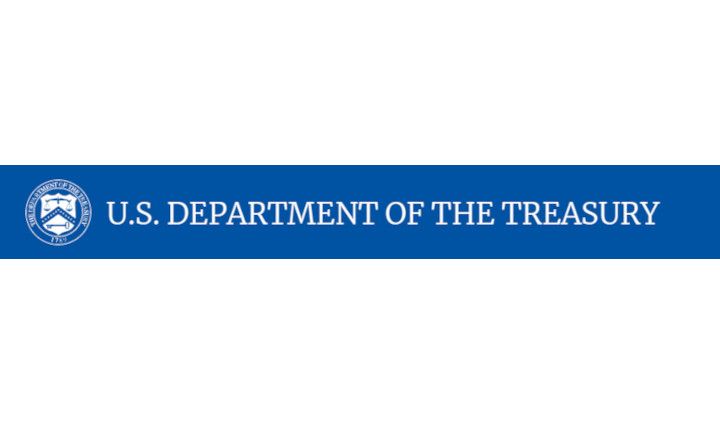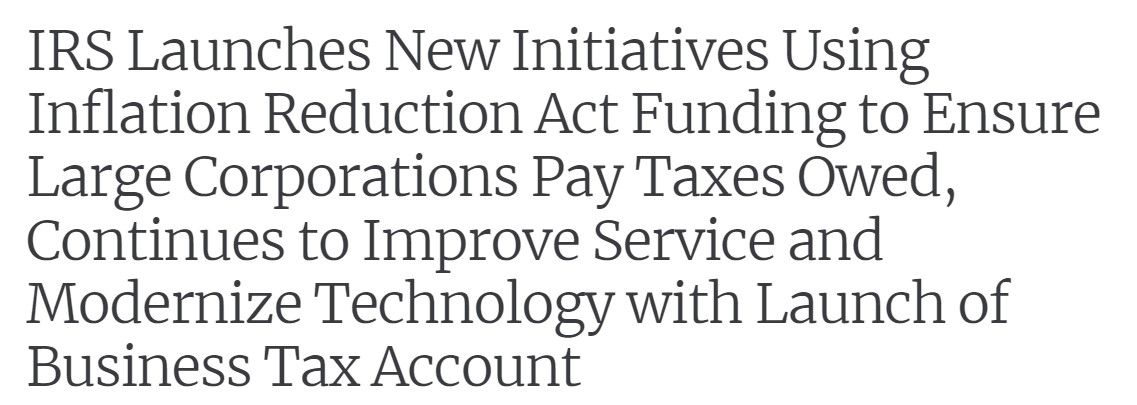U.S. Department of Treasury: IRS Launches New Initiatives Using Inflation Reduction Act Funding to Ensure Large Corporations Pay Taxes Owed.


Following a dramatically improved 2023 Filing Season thanks to Inflation Reduction Act (IRA) investments, the Internal Revenue Service (IRS) has targeted IRA resources on strengthening enforcement, with announcements on new initiatives to pursue high-income, high-wealth individuals who do not pay overdue tax bills and complex partnerships. Today the IRS is announcing new initiatives to ensure large corporations pay taxes owed. As these initiatives to improve compliance among high-income individuals, complex partnerships, and large corporations ramp up, the IRS is continuing its work to improve customer service and modernize core technology infrastructure, most notably with the launch of Business Tax Account.
ENSURING LARGE CORPORATIONS AND HIGH-INCOME, HIGH-WEALTH INDIVIDUAL TAXPAYERS PAY TAXES OWED:
The IRS is working to ensure large corporate and high-income individual filers pay the taxes they owe. Prior to the Inflation Reduction Act, more than a decade of budget cuts prevented the IRS from keeping pace with the increasingly complicated set of tools that the wealthiest taxpayers use to hide their income and evade paying their share. The IRS is now taking swift and aggressive action to close this gap.
Large Foreign-Owned Corporations Transfer Pricing Initiative: The IRS is increasing compliance efforts on the U.S. subsidiaries of foreign companies that distribute goods in the U.S. and do not pay their fair share of tax on the profit they earn of their U.S. activity. These foreign companies use transfer pricing rules year after year to report losses that are engineered through the improper use of these rules to avoid reporting an appropriate amount of U.S. profits. To crack down on this strategy, the IRS is sending compliance alerts to approximately 150 subsidiaries of large foreign corporations to reiterate their U.S. tax obligations and incentivize self-correction.
Expansion of the Large Corporate Compliance program: The Large Business & International Division’s (LB&I) Large Corporate Compliance (LCC) program focuses on noncompliance by using data analytics to identify large corporate taxpayers for audit. LCC includes the largest and most complex corporate taxpayers with average assets of more than $24 billion and average taxable income of approximately $526 million per year. As new accountants come on board in early 2024, LB&I is expanding the program by starting an additional 60 audits of the largest corporate taxpayers selected using a combination of artificial intelligence and subject matter expertise in areas such as cross-border issues and corporate planning and transactions.
Cracking Down on Abuse of Repealed Corporate Tax Break: Following the 2017 repeal of a provision of the code that provided a deduction for producing goods in the U.S., the IRS received hundreds of claims collectively seeking more than $6 billion in refunds, with a significant portion of filers claiming the deduction for the first time. The IRS launched a campaign to address noncompliance and review high-risk claims in this area. IRS efforts have been incredibly successful in ensuring revenue is collected. The efforts have recently been supported by a significant win in the Tenth Circuit Court of Appeals, which sided with the Tax Court and IRS in denying a refund claim based on a $1.8 billion deduction. This will have far-reaching benefit to the IRS’ ongoing efforts in this space.
Prioritization of high-income cases: The IRS has been ramping up efforts to pursue high income, high wealth individuals who have either not filed their taxes or failed to pay recognized tax debt. These efforts are concentrated among taxpayers with more than $1 million in income and more than $250,000 in recognized tax debt. Building off earlier successes that collected $38 million from more than 175 high-income earners, dozens of Revenue Officers are focusing on these high-end collection cases in the coming fiscal year. As announced in September, the IRS has begun contacting about 1,600 new taxpayers in this category that owe hundreds of millions of dollars in taxes.
Wut Mean?:
- The IRS is intensifying efforts to ensure that high-earning individuals and big corporations settle their tax dues. Historically, budget cuts hindered the IRS, but with the IRA, they are aggressively addressing these gaps.
- The IRS is emphasizing the compliance of U.S. subsidiaries of foreign companies. Such entities often misuse transfer pricing rules to underreport U.S. profits. In response, the IRS is notifying roughly 150 of these subsidiaries about their tax responsibilities and encouraging self-correction.
- The Large Corporate Compliance program is expanding. Managed by the Large Business & International Division, this program uses data analytics to identify major corporate taxpayers for audits. The program will grow in 2024, initiating an additional 60 audits, aided by artificial intelligence and expertise in cross-border and corporate transactions.
- The IRS has successfully countered misuse of a repealed tax break from 2017, which led to claims for over $6 billion in refunds. The agency has made strides in this area, recently achieving a court victory that denied a significant $1.8 billion deduction claim. This success bolsters the IRS's ongoing crackdown efforts.
- The IRS is prioritizing high-income individuals, specifically those earning over $1 million with tax debts exceeding $250,000. Following prior efforts that recouped $38 million from such earners, the agency has intensified its focus and started reaching out to 1,600 new taxpayers in this bracket with significant tax liabilities.
How could this impact GameStop?:
If a firm (or an individual) faces a new large, unexpected tax bill, they might need to liquidate assets or close trading positions to generate the necessary cash to pay that bill.
Here's what could happen:
- If the tax bill is significant, the firm or individual might not have enough cash on hand to cover it and would need to generate some liquidity. One way to do this is to close profitable trading positions (destroying 'positive' collateral propping short positions up now).
- Additionally, as we have learned, many trading positions (especially in the derivatives markets) are leveraged, meaning the firm has borrowed money to amplify their position size. If the firm has a large outstanding tax bill, their creditworthiness might be impacted, leading to margin calls. This would force the firm to face margin calls: either deposit more cash or securities with their broker or to close out positions.

TLDRS:
- The IRS Launches New Initiatives Using Inflation Reduction Act Funding to Ensure Large Corporations Pay Taxes Owed.
- The IRS is intensifying efforts to ensure that high-earning individuals and big corporations settle their tax dues.
- Historically, budget cuts hindered the IRS, but with the IRA, they are aggressively addressing these gaps.
- The IRS is emphasizing the compliance of U.S. subsidiaries of foreign companies.
- Such entities often misuse transfer pricing rules to underreport U.S. profits.
- In response, the IRS is notifying roughly 150 of these subsidiaries about their tax responsibilities and encouraging self-correction.
- The Large Corporate Compliance program is expanding. Managed by the Large Business & International Division, this program uses data analytics to identify major corporate taxpayers for audits.
- The program will grow in 2024, initiating an additional 60 audits, aided by artificial intelligence and expertise in cross-border and corporate transactions.
- If a firm (or an individual) faces a new large, unexpected tax bill, they might need to liquidate assets or close trading positions to generate the necessary cash to pay that bill...



